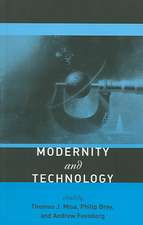Networks of Power – Electrification in Western Society, 1880–1930
Autor Hughesen Limba Engleză Paperback – 28 feb 1993
A unique comparative history of the evolution of modern electric power systems, Networks of Power not only provides an accurate representation of large-scale technological change but also demonstrates that technology itself cannot be understood or directed unless placed in a cultural context. For Thomas Highes, both the invention of the simplest devices (like the lightbuld itself) and the execution of the grandest schemes (such as harnessing the water power of the Bavarian Alps) fit into an overaching model of technological devleopment. His narrative is an absorbing account of the creative genius, scientific achievements, engineering capabilities, managerial skills, and entrepreneurial risks behind one of the most commonplace amenities of the modern age.
Preț: 430.54 lei
Nou
Puncte Express: 646
Preț estimativ în valută:
82.39€ • 85.70$ • 68.02£
82.39€ • 85.70$ • 68.02£
Carte tipărită la comandă
Livrare economică 15-29 aprilie
Preluare comenzi: 021 569.72.76
Specificații
ISBN-13: 9780801846144
ISBN-10: 0801846145
Pagini: 488
Ilustrații: 226 illus.
Dimensiuni: 215 x 279 x 31 mm
Greutate: 1.1 kg
Ediția:Revised
Editura: Johns Hopkins University Press
Locul publicării:Baltimore, United States
ISBN-10: 0801846145
Pagini: 488
Ilustrații: 226 illus.
Dimensiuni: 215 x 279 x 31 mm
Greutate: 1.1 kg
Ediția:Revised
Editura: Johns Hopkins University Press
Locul publicării:Baltimore, United States
Notă biografică
Thomas P. Hughes is professor of the history of modern science and technology at the University of Pennsylvania and a member of the American Academy of Arts and Sciences. His books include Changing Attitudes toward American Technology and Elmer Sperry, Inventor and Engineer.
Descriere
Awarded the Dexter Prize by the Society for the History of Technology, this book offers a comparative history of the evolution of modern electric power systems. It described large-scale technological change and demonstrates that technology cannot be understood unless placed in a cultural context.













